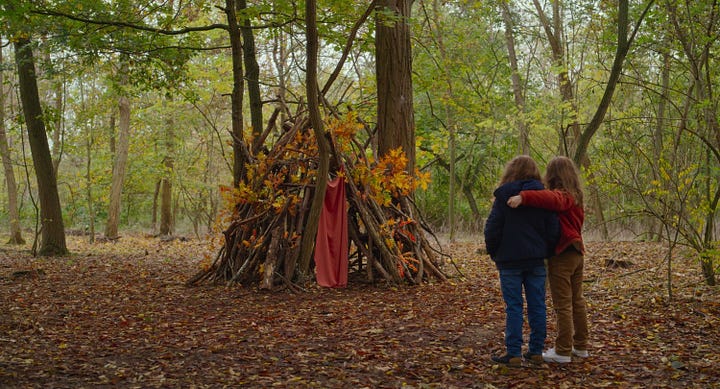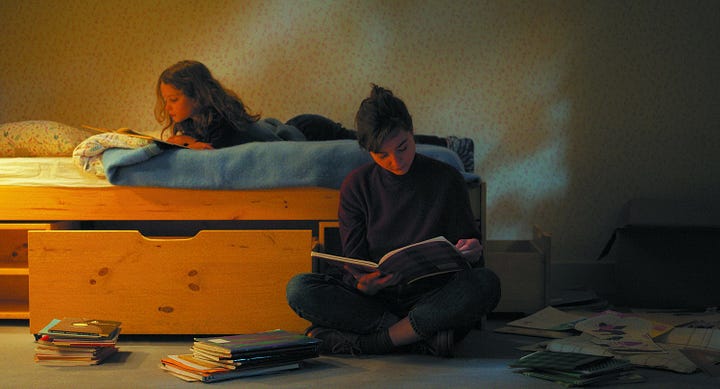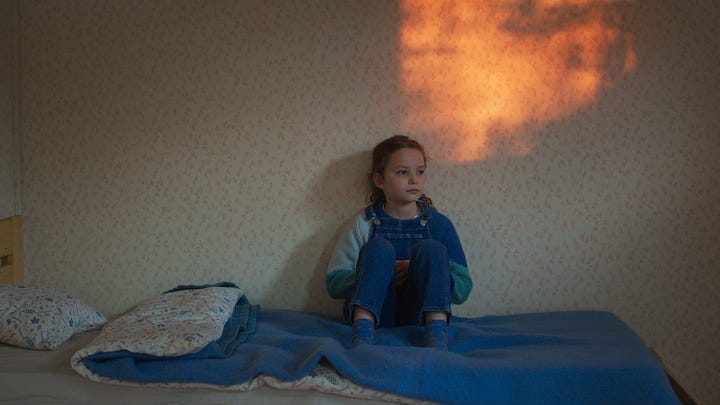Mimesis
My daughter wouldn’t hurt a spider That had nested Between her bicycle handles For two weeks She waited Until it left of its own accord If you tear down the web I said It will simply know This isn’t a place to call home And you’d get to go biking She said that’s how others Become refugees isn’t it? from Alight (Copper Canyon, 2013)
The other day, walking down one of my high school’s hallways, I heard three students scream at the top of their lungs. They were behind me; I had just passed them. I spun around, ready — or so I thought — to deal with whatever had caused the scream. I assumed the worst; I was not prepared. And then I heard laughter. High-pitched, joyous, loud. The three students were batting away a fly, surprised at their own reaction to it.
My body had been tense. I was ready, I think, for violence, in whatever way it is actually possible to be ready for such a thing — in the way, now, we witness and experience the tragedy of violence in schools so often. But when I saw the fly, and when I heard the laughter, my body relaxed — I think, in part, because it didn’t want to be a thing ready to participate in violence, despite its capability. The fly was big, but it was harmless. As most things are. As we often aren’t. I watched it dart and dance in circles in the hallway, occasionally landing on the wall by where the students stood. They’d let out small screams, still scared, in their own way, by the small things that cause no harm. A beautiful reminder of innocence. I wanted to hold it for as long as I could, this reminder. I guess, by writing it down, that I am.
I am thinking and holding on to this moment as I read today’s poem, which is a poem that reminds me of the near-limitless capacity for imagination and empathy that children have — the kind of thing that we lose as we age into a world that replaces the imagination with reality, a stoic kind of cynicism that feels less about permissibility and possibility and more about maintaining the status quo.
What I love, especially, about today’s poem is the way in which the speaker de-centers himself from the answer (or imaginative possibility) posed by the poem’s end. Here, again, are the final two stanzas:
If you tear down the web I said It will simply know This isn’t a place to call home And you’d get to go biking She said that’s how others Become refugees isn’t it?
I love Joudah’s willingness to allow the “I” of this poem to be an “I” that offers a perspective limited by the confines of accepted reality. It is an “I” of realism, an “I” of reason. It is not, however, the center of this poem’s place of imagination. That lives in the “she” of this poem, the “she” who offers a question that pokes at reality, that unmoors the voice of reason from reason itself — so often a place that justifies something like violence. Small violence, in this poem’s case, but violence nonetheless. By de-centering the speaker’s perspective, particularly when the speaker is already speaking from a place of power (as a parent), Joudah allows this poem to be a poem, too, about humility. Humility: not just the work of admitting one’s wrongness, but also the work of maintaining an open place in one’s body, a place to accept, from whatever tangential angle, something other than what one immediately holds dear.
Funny, how admit literally means to send away, as if, in order to accept something, we have to let go of something else. I think that sometimes this must be true. We let go of a preconception, an ideology, to accept a new perspective, or what might seem new to us at the time. But in the case of people? I have to believe that we do not have to send away in order to accept. I have to believe that there is room for all of us, right here in this room that is where we are.
Joudah does the same work of today’s poem in another of his poems, “Things You’ve Never Seen,” which reads, in full:
When I tell it, the first time I saw hail, I say it was in a desert and knocked a man unconscious then drove a woman into my arms because she thought the end was near but I assured her this wasn’t the case. When he tells it, he smiles, says the first winter after their exodus was the coldest. Rare snow came down, and his mother, who knew what the fluff was but until then had never seen it, woke him and said, Look outside, what do you see? She called his name twice. It was dark. Snow fell a paragraph to sum up decades of heat. He had no answer. She said, this is flour from heaven. When he tells it, he’s an old man returning to his mother.
Here, the juxtaposition of the “I” and the “he” works in a similar way as today’s poem does. Joudah de-centers his speaker from the realization of the poem. He allows his speaker to contribute to the poem’s tension. He gives his speaker the possibility of being wrong. It might not seem generous. Certainly wrongness does not seem generous at all. But from an author’s perspective, it is. The “I” of this poem above is documenting; they are literal, certain. When that “I” meets the narrative offered by another character, it meets metaphor, beautiful thing — “flour from heaven.”
Joudah crafts both the poem above and today’s poem in such ways that de-center rightness, that show the reader that the truly imaginative or generous possibility inherent in a poem does not have to come from the speaker of such a poem. It can come from the margins. From the question posed at the poem’s end. From the radical perspective offered from a character who is not the poem’s speaker.
If I had to imagine some criticism of today’s poem, it might be a criticism grounded in disbelief, as in I don’t believe your daughter said that, as if a poem had to be entirely true, or, perhaps more importantly, as if a child wouldn’t, in a scenario about harm and those that we neglect or disregard as we act out our harm, say something as empathetic and imaginative as what the daughter says in today’s poem.
I’m interested in that latter criticism. I’m interested in it because the absurdity of the mature and adult world is not lost on me. Earlier today, I came across a photo of former Vice President Mike Pence signing a bomb in Israel, a bomb intended for use in the ongoing strikes of Lebanon. He is holding a marker and signing the bomb with the marker, like kissing a bullet before firing it, tattooing a fist before it hits a face. So many of the horrors of this world are perpetuated in this way — with a kind of gleeful, awful recklessness that we become accustomed to because of ceremony. The ceremony of adults, posing for a photograph, looking strong and serious as they sign the bomb. It is this adult world that repeats itself, over and over again, in these demonstrations of unchecked power, labeled and sold to us as something rational, based in reason, or in the complexity of politics we just won’t understand, those same politics where those in the margins — and yes, children, too — are denied the respect of their voice, their imagination, their insight. Sometimes, even, their existence. In November, the UN chief called Gaza a “graveyard for children.” In December, the Euro-Mediterranean Human Rights Monitor reported that over 10,000 Palestinian children have been killed since October.
If I could design and teach any class, or lead any discussion around books, I think I’d center it around children in literature, and the books that have, in allowing a child’s perspective to shape the narrative, shaped me, in turn.
I think of Lorrie Moore’s Who Will Run the Frog Hospital, and how, in a moment when her narrator thinks back to a childhood spent with a rotating door of guests, Moore writes:
It reminded me of how children always thought too big; how the world tackled and chiseled them to keep them safe.
That moment is followed by a perfect paragraph:
Certainly "safe" is what I am now--or am supposed to be. Safety is in me, holds me straight, like a spine. My blood travels no new routes, simply knows its way, lingers, grows drowsy and fond. Though there are times, even recently, in the small city where we live, when I've left my husband for a late walk, the moon out hanging upside down like some garish, show-offy bird, like some fantastical mistake--what life of offices and dull tasks could have a moon in it flooding the sky and streets, without its seeming preposterous--and in my walks, toward the silent corners, the cold mulchy smells, the treetops suddenly waving in a wind, I've felt an old wildness again. Revenant and drunken. It isn't sexual, not really. It has more to do with adventure and escape, like a boy's desire to run away, revving thwartedly like a wish, twisting in me like a bolt, some shadow fastened at the feet and gunning for the rest, though, finally, it has always stayed to one side, as if it were some other impossible life and knew it, like a good dog, good dog, good dog. It has always stayed.
I adore this novel, and I adore it for how much Moore understands and seems to respect the imaginative love-of-world-and-experience at the heart of a child’s perspective. It’s there in how she describes the violence of the world — tackling and chiseling a child as they grow up, so they no longer think with that same bigness of imaginative possibility. And it’s there in that phrase — some other impossible life. Moore understands, I think, with great sorrow, what this world often forces us, sometimes with painful, painful difficulty, to abandon: the child’s voice in today’s poem — empathetic, kind, insightful, and so, so big-hearted.
Or, I think of Richard Powers’s Bewilderment, and how, in that novel, centered around a father raising his young son, he writes:
Life is something we need to stop correcting. My boy was a pocket universe I could never hope to fathom.
And I think of that notion of correction, and how quickly it becomes a part of a child’s life. I think of a moment from Ali Smith’s Spring, when she writes:
A child grows up saying words that the rest of the world tells the child aren’t words. But the child and everybody the child holds dear all know that the words mean, and what the words mean. Listen, that child will be equipped, from the very beginning. For everything, dark and light, heavy and light, that life will bring to that child.
I think of how easily someone could correct the daughter in today’s poem, could tell the daughter that what they are saying isn’t really what they are saying, that it’s more complicated, or not so simple, or whatever they might say that is corrective and dismissive, and I think of how easily someone could correct Fady Joudah for “employing” the daughter in this poem, as a kind of device, as if a child couldn’t or wouldn’t say such a thing, as if a child isn’t — as the title, “Mimesis,” of today’s poem suggests — actually perfectly able to discern the mimetic acts of this world, those moments when something resembles life itself, when a spider resembles someone on the margins, when a father resembles someone perpetuating violence.
And I think, finally, of one of my favorite films in recent memory — the French film Petite Maman. I’ve included some gorgeous movie stills below. It is a film about wonder and play, about grief and loss, about mothers and daughters. It is a film that reminded me of the sharp insight that childhood can provide, insight offered from that place where learning and experience meet, when you don’t yet have a name for everything, and so you come up with your own names, your own games, your own ideas to fill the voids that often open up. They are serious things — the ways in which children make sense of the world. I don’t think we say that often enough.




And so, when I think of today’s poem, I think of how seriously we deserve to take the daughter’s reflection in the poem’s final lines. And I think, yes, about correction. I think about that daughter growing up into a world that will constantly correct her. A world of school and learning and power and politics and reason. A world where, sadly and so often, her voice will be discounted, made to seem like less, placed into the difficult and near-impossible binary of either right or wrong. Over and over again. Day after day. This is how children grow up. With imagination and play and wonder and the sharpness of insight. And then, as Moore writes, with the sad fact of such things getting tackled and chiseled away.
I think that one of the best parts of adulthood is a kind of discernment, one that involves holding onto the imagination of childhood and finding how beautiful it can be when paired with something — with skill, perhaps, or with generosity. It’s why I love cooking so much, how it melds the wonder of flavor with the very real fact that, yes, you can burn the garlic. It is both the joy of experiment and the joy, too, of learning how to develop your wonder, to practice it in real time, to direct it toward a task and watch it blossom. Today’s poem is the result of such discernment, isn’t it? It involves the skillful placement of the imagination of the child’s response. That is part of the art of poetry — part wonder, part play, part imagination, part placement of it all. It models what the world often fails to model for us. It is a craft, when so much of the world is a charade.
It takes imaginative work to support, heal, and exist within the aftermath of the harm caused by that charade. It takes imaginative discernment, imaginative possibility. And I guess I want to continue holding on. To the part of me that does not want to correct the daughter in this poem. To the part of me that loves to watch the cherry tomatoes burst in the pan, and make their own sauce. To the part of me that wants to see a pocket universe in every ant walking along the rim of a glass, every person on the train. To the part of me that still thinks maybe a little too big, but also not big enough. To continue holding on even when the world makes me feel small for it all.
Some notes:
If you are in Boston this week, I’m the featured reader at the Boston Poetry Slam this Wednesday! Come through if you’d like; details here.
The Brookline Booksmith and Mosab Abu Toha put on a beautiful reading in support of the Edward Said Libraries in Gaza. I watched and listened to it live this weekend, and it seems you can still view it here. It’s worth your time and attention.
As I mentioned in past newsletters, the ad hoc coalition Writers Against the War on Gaza has been a powerful resource that has, in these days, reminded me of all the various potentials for solidarity in this moment. You can follow them on Instagram here.
A little note if you are a yearly paying subscriber to this newsletter: many of you subscribed around this time (in January 2023), and I imagine your renewal is coming up. So, if you intended to purchase that yearly subscription as a kind of token of your appreciation (thank you!!!), make sure to unsubscribe if you meant it as a one-time thing. No offense or strange ill-will will be taken or had on my part at all — just gratitude for your appreciation in the first place.
If you’ve read any of the recent newsletters, you’ve perhaps noticed that I am offering a subscription option. This is functioning as a kind of “tip jar.” If you would like to offer your monetary support as a form of generosity, please consider becoming a paid subscriber below. There is no difference in what you receive as a free or paid subscriber; to choose the latter is simply an option to exercise your generosity if you feel willing. I am grateful for you either way. Thanks for your readership.





This is all just amazing. Thank you. I LOVE Lorrie Moore. We went to high school together, but I never knew her really. She is absolutely incredibly brilliant. And Richard Powers - yes, that line in Bewilderment is what I remember most from that gorgeous book. In the pressurized, opressive, and dangerous world that has become teaching, thank you for your imagination and care, and hard work.
Thank you for this. I am a teacher who has recently been feeling weighed down by not only my own lack of wonder but the lack of wonder I am able to allow my children in an education system designed with so little space for joy.